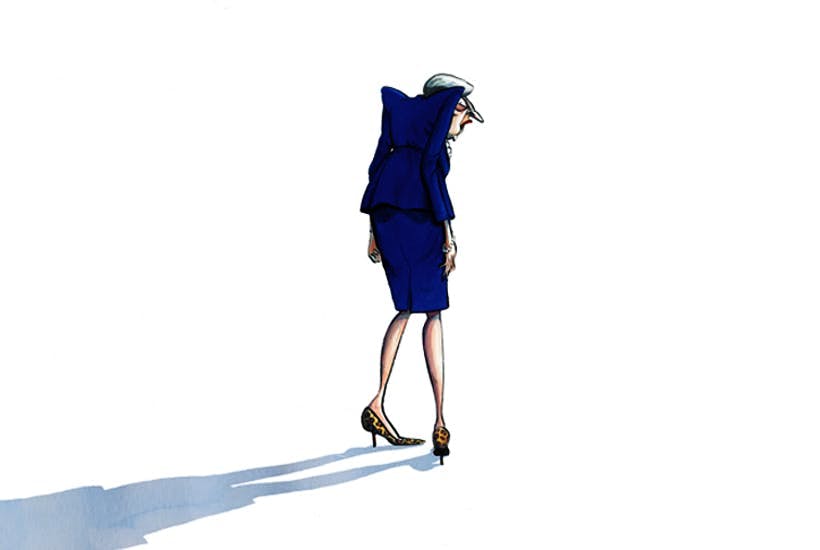I’ve been surprisingly kind about Theresa May in many of the articles I’ve written here and elsewhere. Surprising, because I never thought much of her as a politician or a person before the spring of 2017.
Politically, I found her approach to immigration while Home Secretary to be dreadful and borderline dishonest. That continued seamlessly into her handling of Brexit in 2016, when she made the biggest policy decision of the era – to leave the single market – solely because of the way it related to immigration.
Personally, well, like other Lobby correspondents of a similar vintage I can attest that lunch with Theresa May is like crossing a desert at night: cold, dry, shedding no light and seemingly endless.
But after the 2017 election, I thought May did OK. The deal she eventually struck with the EU was, under the circumstances, a decent one. Britain, and the Union, would be in a happier position today if MPs had passed the thing. The history of Brexit won’t have much to say about May, but ‘What If May’s Deal Had Passed?’ will be an interesting counterfactual one day.
In essence, she dealt herself a bad hand, then played it well.
I also heard encouraging things about May as a person. People I respect spoke highly of her sense of duty and her integrity over Brexit. They say she knew shifting from a Northern Ireland only backstop could be politically damaging, but did it anyway because she thought the Union more important than her career. (To be fair there was always also a contrary view that May was too happy to let civil servants, especially Olly Robbins, bear criticism for a deal she struck.)
But this weekend saw the publication of a report that almost makes me regret being kind to May.
The report is from Sir Anthony Seldon’s history of the May premiership. Like his other books, it draws heavily on interviews with participants. Sir Anthony is not a scandal-merchant or a controversialist. In other words, I think we can trust his reporting.
Recalling the morning after the 2017 election, he writes of May:
‘She left to return to Downing Street at about 6am as the news confirmed that the UK had a hung parliament. The final results were the Conservatives on 317 seats (down 13) and Labour on 262 (up 30). Corbyn emerged as the moral victor, May the clear loser.
The result was through the floor of even the party’s most pessimistic predictions. Hill remembers standing alongside Timothy in CCHQ, as he told May again: “I think I need to resign.” May was fidgeting with her phone, responding to the occasional text message. She responded coldly: “I think you both need to resign.”’
Hill is Fiona Hill. Timothy is Nick Timothy. They were May’s chiefs of staff. They are friends of mine, so you are of course free to ignore what I say next. I have not discussed this article with either of them. Nor did I know about that moment or May’s comment until I read it in Sir Anthony’s book.
Now that I do know, I am even more convinced that my friends were treated badly by their former boss, that she behaved appallingly over her own, defining, electoral failure.
Look again at that account of May’s response to her aides. She’d just led her party to near-defeat. She ran a campaign that cost her party seats and votes. She failed to persuade voters she deserved a majority.
To state the obvious, May was in charge of her campaign. The message, the manifesto, the strategy: they were hers. All the decisions, the choices, were ultimately hers. The buck stopped with her, because that’s what it means to be a leader. You take responsibility for things done in your name. That is leadership.
Did Timothy and Hill get things wrong in that campaign? Obviously. Was the decision to call the election in spring 2017 a mistake? Probably; Autumn 2016 would probably have been better.
But was May right to blame her aides for that shattering loss? Was she justified in that cold dismissal, not just accepting, but demanding their resignations? No. The blame, in the end, belonged to her, not them. She was in charge, not them. She called the election and she ran it. If she thought the election and campaign were so bad that someone had to resign, it should have been May herself. She was in charge.
A wise man once said that power reveals. How a person acts when they have a position of authority over others tells you a great deal about them. Sometimes this can be seen in the small things: across a restaurant table in Mumbai in 2007, I watched Chancellor Gordon Brown be unpardonably rude to a waiter; the dismal way he treated No. 10 staff later was no surprise. And sometimes the revelation comes in moments of high drama. I’m not David Cameron’s greatest admirer, but every account I’ve heard of his reaction to his referendum defeat says he didn’t offer the merest whisper of blame or recrimination towards his team or allies. He accepted the failure was his to bear. And today, when people ask Boris Johnson about Dominic Cummings’s antics, he is clear that as PM he bears responsibility for the actions of his staff.
In Theresa May’s moment of greatest failure, her reaction was not to shoulder responsibility but to blame others. Instead of facing up to her duties as a leader, she kicked downwards. That is revealing, and shameful.








Comments